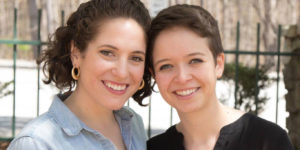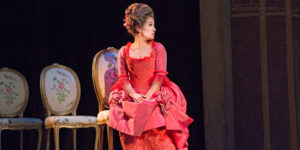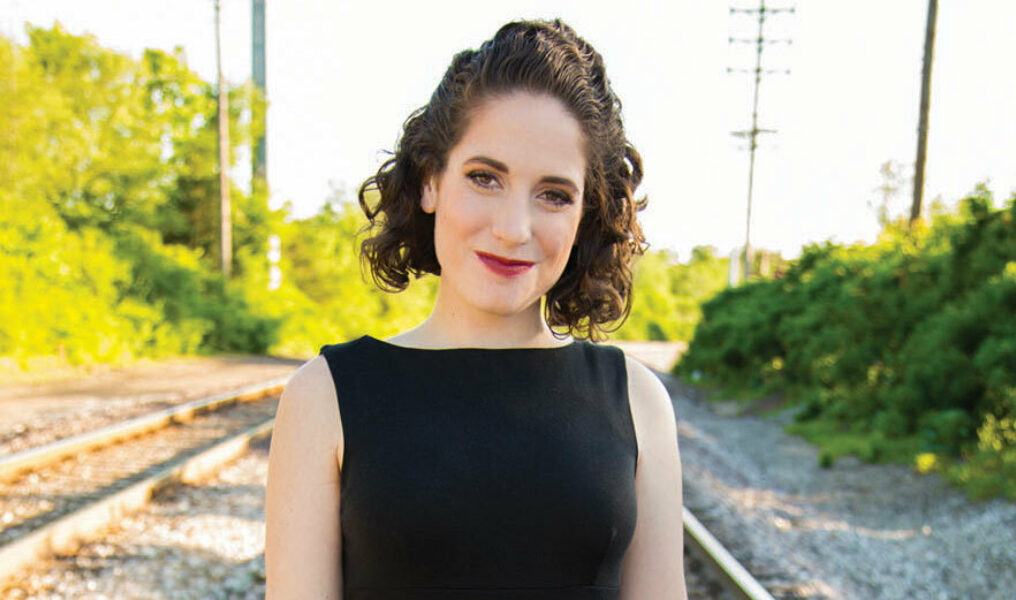A night out in Paris is never a mistake. And in the early 1900s, a trip down its cobble-stoned streets to the salon at 27 rue de Fleurus was an excellent decision. On an ideal night, one could make the acquaintance of Pablo Picasso, Ernest Hemingway, F. Scott Fitzgerald and even more artistic leaders of the time. In charge of it all was Gertrude Stein, who is perhaps the best-known lesbian author in history. And, at her side, was always her wife Alice Toklas.
Toklas herself was a fixture of the Parisian avant-garde, and though she was never known to the degree of Stein, it was her support that kept the couple afloat for nearly four decades. That relationship, and everything that came with it, is explored in depth in Ricky Ian Gordon's opera "27," slated to appear on March 2 and March 3 at Ann Arbor's Arthur Miller Theatre as part of the Michigan Opera Theatre's 2018 season, as well as on March 10 and 11 at the Macomb Center for Performing Arts. Twenty-seven-year-old soprano Monica Dewey will be tackling Toklas' role.
Dewey is an award-winning singer who holds a bachelor's degree in music and arts administration from the University of Kentucky and a Master's of Music degree from Indiana University. Most recently, in the spring of 2017, the Georgia-born singer was awarded first prize in the 10th International Hilde Zadek Voice Competition at the Musikverein in Vienna and received a Sullivan Foundation Award. Though she has played a variety of roles throughout her career, Dewey, who is openly gay, said she was excited to play a character whose sexuality she can identify with.
Between The Lines caught up with Dewey to get her take on playing Toklas, explore her love of opera and learn about her perspective as an LGBTQ opera singer.
Were you always musically inclined as a kid, or did you take interest in it later?
I grew up in a musical family. My dad really encouraged music making in the house. I'm the youngest of four, so at special events or parties, it always ended up with us around the piano and my dad playing and all of us singing. Another interesting and unique thing to my family: We grew up with a music room in our house. So, the extra room that is usually like a TV room or a study, my dad wanted it to be a music room.
We had an awesome grand piano and tons of different instruments like drums; there were always three or four accordions sitting around, trumpets, a violin, a harmonica. So, it was just kind of encouraged, and it was a big part of my upbringing.
With all of those instruments available, what drew you to singing?
I really fell in love with piano and was encouraged to continue with piano through high school and senior year, and I developed a great relationship with my piano teacher. I also played oboe in middle school. So, it's funny, I kind of came to singing last.
I started singing when I was 16, and it was kind of like all these previous experiences in music culminated into just one amazing art form that was singing. I kind of knew right when I started singing that this was going to be it.
I started taking lessons when I was 16 and continued doing voice in college. The window of opportunity is quite small as a singer, you know? You really gotta start at 16, see what the voice does at 21, and then by 22, 23 you're doing your degree, and by the time you're out of there with your degree at 25, 26, you're hoping things will line up. So, that's about where I am right now.

Monica Dewey (left) sang her first opera at 19. Now, at 27, she is gearing up for a performance as Alice B. Toklas in "27." Here she is pictured with her photographer girlfriend Synthia Steiman.
What's the biggest challenge for you as a soprano?
Definitely the biggest challenge is that there are going to be twice as many sopranos as every other voice type. It can be difficult for opportunities; you've just got more people competing for the same part. The opera world is interesting. It's always going to be tough; it's a tough career and you know that going in.
Knowing that, did you feel any intimidation trying to break into the world of opera?
You know, I didn't feel that way. It may be because my interest in opera started on YouTube (laughs). I started watching videos of really popular, recognizable videos like "Queen of the Night," and I knew the melody, but I never knew she was this amazing character and all the amazing stuff she did on stage. That was when I was like, 'Oh, cool! It's not just these recordings. It's an art form on stage.' That element was really enticing to me, because as a piano and an oboe player, I never had the chance to experience the music through acting, and that became just a really great part of singing for me.
What's the best part about performing for you?
I think the coolest part is how it always changes – and this is with any music – but no performance is going to be the same, and the great thing about being onstage with others is you get to feel their energy each night in a different way. The things you've done in the rehearsal room the same way, it may change onstage and you have to go with it. So, there's this spontaneous element of acting and working with others that I really enjoy.
You've been in operas since you were 19. Is Alice Toklas the first LGBTQ role you've ever played?
Absolutely. Most of the characters that I portray as a light-lyric soprano are kind of like the ingenues, they're usually using their sexuality to get what they want, they're trying to get the attention of all the men onstage – the tenor, you know. Sometimes they'll be the maid and sometimes it's comic relief. So, yeah, I've never had the opportunity to play a character like Alice, and it's cool because I really relate to her on many levels.
Did you know anything about her going in?
I knew who Gertrude Stein was, and I knew she was a lesbian icon, but Alice is kind of in the shadows, so I didn't know much about Alice until I started doing some research. It's been really cool getting to know her character and getting to know her relationship with Gertrude and their time together in Paris, where they had basically celebrity status among the elite artists.
You only came out recently. Were you worried about being open about your sexuality?
Yeah, to be honest. I will say that the operatic community and the classical music community is very supportive, and it's a family. Coming out, it was just an extension of that family. It was not an issue at all, but I did worry a bit as a woman, would it be hard for me to portray these female leads that are in love with men? But that hasn't been an issue at all, actually. If anything, being open with my colleagues and being true to myself, it helps us create a better story together.
And such a big part of theater is honesty. If anything, me being true to myself, it allows me to explore deeper into characters and, I think, reach audiences in a deeper way.
Is there anything in the performance that you identify with specifically?
Yes. In the first scene, they are in their salon and all these people are there kind of chattering and they say, "Come see the writer. The writer and her secretary." I interrupt them, and I say, "Her wife." They say, "The writer and her companion." And I interrupt again, and I say, "The wife!" Like, I'm not just her secretary, I'm not just her companion; please use the real term, I'm her wife.
That was a big part of me coming out. A lot of people called my girlfriend "my friend" or "my special friend." And I almost get tears each time that moment happens in the opera, because we're talking over 100 years ago, and she was willing to say, "No, I'm her wife and you guys are going to recognize that." And they did! And Gertrude, it was such a man's world in art and painting and writing, and she turned it around. They were coming to her and begging for her attention.

Monica Dewey performing from Handel's "Alcina" at Indiana University Opera Theatre. Photo: Patrick Eddy
What's the one message you'd like the audience to leave "27" with?
I hope people see the quirky elements in Alice, and the pure power couple that Alice and Gertrude were. I hope they go away thinking, "Wow, these women really ran the Paris art scene at the time, and how cool is that?"
"27" will make its Michigan premiere on March 2 and 3 at the Arthur Miller Theatre in Ann Arbor, and on March 10 and 11 at the Macomb Center for Performing Arts.
Tickets start at $30. For more ticketing and directional information go to michiganopera.org/opera/ricky-gordons-27. For more information about Monica Dewey, visit monicadewey.com.










